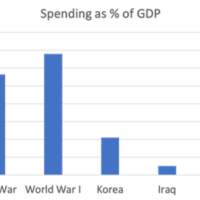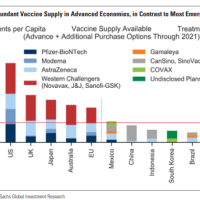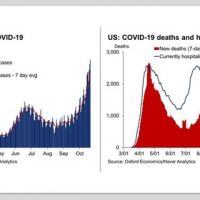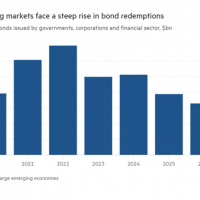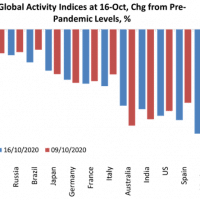-
Climate change: the fault of humanity?
The sixth report from the Intergovernmental Panel on Climate Change (IPCC) runs to nearly 4,000 pages. The IPCC has tried to summarise its report as the ‘final opportunity’ to avoid climate catastrophe.
-
The year of the pandemic
So maybe not just one year of the pandemic.
-
COVID vaccines: calling the shots
Before the COVID-19 pandemic engulfed the world, the big pharmaceutical companies did little investment in vaccines for global diseases and viruses.
-
COVID 2021: More calamity ahead?
The death rate from these new infections may be lower than in the first wave last March-April, but hospitalizations are reaching new peaks in the U.S. and parts of Europe.
-
Debt disaster with no escape
According to the IMF, about half of Low Income Economies (LIEs) are now in danger of debt default. ‘Emerging market’ debt to GDP has increased from 40% to 60% in this crisis.
-
The IMF smokescreen
Global emissions fell by 8.8 per cent in the first half of this year amid restrictions on movement and economic activity owing to the coronavirus pandemic, according to a new report.
-
COVID and the trade-off
Sweden has a relatively low level of urbanisation, is away from continental Europe and has a population prepared to apply social distancing with some discipline, the cumulative COVID death rate in Sweden is not far short of Italy and Spain, and is way higher than its Nordic neighbours, Denmark, Finland and Norway, which did impose early and much stricter lockdowns.
-
Engels on nature and humanity
In the light of the current pandemic, here is a rough excerpt from my upcoming short book on Engels’ contribution to Marxian political economy on the 200th anniversary of his birth.
-
A Critique of Heinrich’s, ‘Crisis Theory, the Law of the Tendency of the Profit Rate to Fall, and Marx’s Studies in the 1870s’
Michael Heinrich’s article is really a continuation of the argument by Monthly Review that Marx’s law of the tendency of the rate of profit to fall (LTRPF) is not the main cause of economic crises.… Heinrich makes the following points: 1) Marx’s law is indeterminate; 2) it is empirically unproven and even unjustifiable on any measure of verification; 3) Engels edited Marx’s works badly, distorting his views about the law in Capital Vol. 3; 4) Marx himself, in writings during the 1870s, began to have doubts about the law as the cause of crises and started to abandon it in favour of some theory that took into account credit, interest rates and the problem of realisation (similar to Keynesian theory); 5) Marx died before he could present these revisions of his crisis theory, so there is no coherent Marxist theory of crisis.


